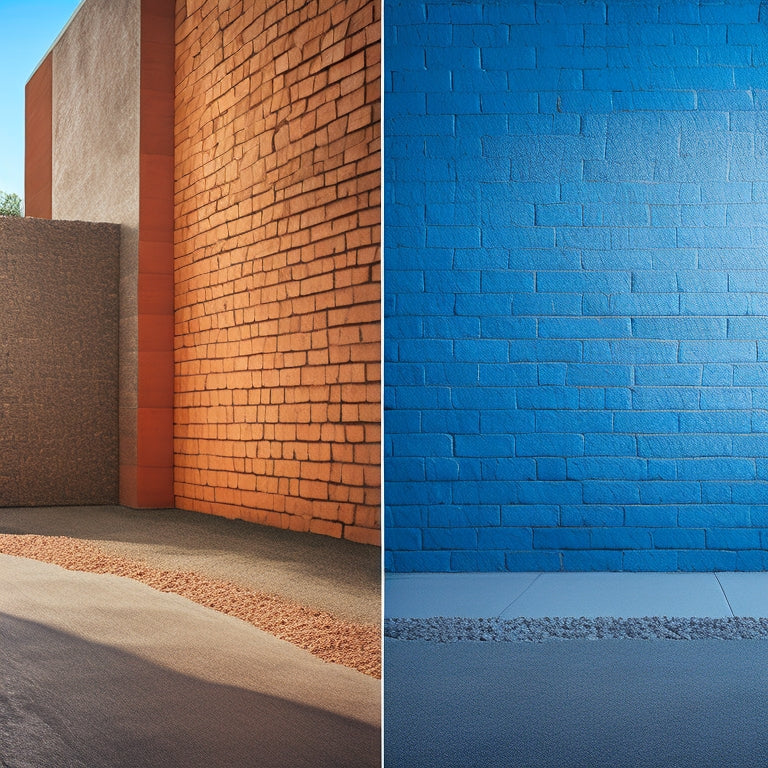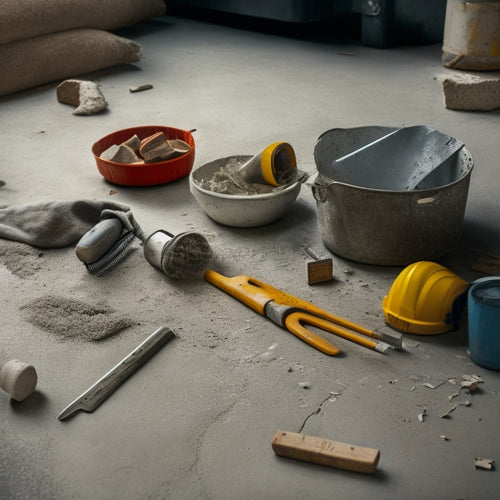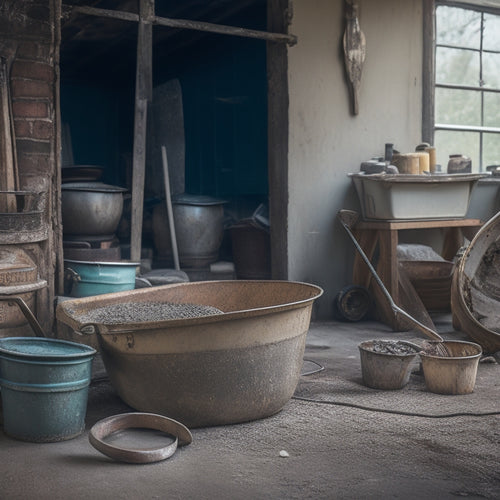
7 Best Tools for Effective Concrete Block Coatings
Share
You'll need a range of effective tools to protect your concrete blocks from damage and wear. For durability, contemplate silane-based sealers that repel water and prevent damage from freeze-thaw cycles and de-icing chemicals. Acrylic coatings provide maximum durability with a flexible, abrasion-resistant film suitable for high-traffic areas. Water-based sealers, epoxy coatings, and specialty coatings for extreme weather conditions are also options to contemplate. To guarantee a smooth application, use user-friendly tools like roller extension poles, microfiber roller covers, and spray tips. By selecting the right tools and coatings, you'll be well on your way to achieving a long-lasting, protected surface that meets your specific needs, and exploring these options further will help you find the perfect solution.
Key Takeaways
• Microfiber roller covers reduce streaks and provide a smooth finish for even concrete block coatings.
• Adjustable handle brushes enhance comfort and control during application, ensuring optimal results.
• Spray tips allow for precise control over coating distribution, minimizing waste and mess.
• Roller extension poles facilitate access to high areas, making it easier to coat hard-to-reach surfaces.
• High-quality brushes with synthetic bristles are ideal for applying epoxy coatings, ensuring a strong and durable bond.
Top Pick: Silane-Based Sealers
You'll find silane-based sealers to be the top choice for protecting and preserving concrete blocks, as they penetrate deep into the surface to form a durable, hydrophobic barrier. This allows them to effectively repel water and prevent damage from freeze-thaw cycles, de-icing chemicals, and other environmental stressors.
When applying silane-based sealers, it's crucial to follow proper application techniques, such as making sure the surface is clean and dry, and applying the sealer in a uniform, thin layer. This will help guarantee peak performance and longevity.
For maintenance, tips include regularly cleaning the surface to prevent dirt and debris buildup, and reapplying the sealer as needed to maintain its protective properties.
It's also important to note that silane-based sealers are breathable, allowing moisture to escape, which helps to prevent trapped water from causing damage.
Best for Durability: Acrylic Coatings
For maximum durability, consider applying acrylic coatings to your concrete blocks, as they form a flexible, abrasion-resistant film that shields the surface from environmental stressors and wear. These coatings are particularly effective in high-traffic areas or where exposure to harsh chemicals is a concern.
To guarantee a successful application, you'll need to focus on proper surface preparation. This involves cleaning the concrete blocks thoroughly to remove dirt, oil, and other contaminants that might interfere with the coating's adhesion. You may also need to repair any cracks or damaged areas before applying the acrylic coating.
When it comes to application techniques, you'll want to follow the manufacturer's instructions carefully. Typically, this involves applying a primer to the prepared surface, followed by one or more coats of the acrylic coating. Be sure to allow each coat to dry completely before applying the next one.
Water-Based Sealers Reviewed
When evaluating water-based sealers for your concrete block coatings, you'll want to take into account three key factors.
You'll need to assess the sealer's durability expectations, including its resistance to wear and tear, as well as its color retention performance over time.
Additionally, you should examine the sealer's moisture resistance testing results to guarantee it can withstand the elements.
Sealer Durability Expectations
When it comes to water-based sealers for concrete block coatings, you can expect them to last between five to ten years, depending on environmental exposure and maintenance.
However, to maximize their lifespan, you'll need to follow proper sealer maintenance tips. This includes regular cleaning to prevent dirt and debris buildup, which can wear down the sealer. You should also avoid using harsh chemicals or abrasive materials that can damage the sealer.
Another vital factor is application timing considerations. Applying a sealer during extreme weather conditions, such as direct sunlight or high humidity, can negatively impact its durability. Instead, choose a time when the temperature is moderate and the surface is dry.
Additionally, make certain to follow the manufacturer's instructions for application and drying times to guarantee a strong bond between the sealer and the concrete block.
Color Retention Performance
How well do water-based sealers for concrete block coatings retain their original color over time, and what factors influence their color retention performance? When evaluating water-based sealers, you'll want to assess their ability to resist color fading, which can occur due to UV exposure. This is critical, as color retention is a key aspect of a sealer's overall performance.
You'll find that some water-based sealers are more susceptible to color fading than others. This can be attributed to the type and quality of the pigments used, as well as the sealer's formulation. For instance, sealers with higher-quality pigments and UV-absorbing additives tend to exhibit better color retention.
Additionally, the application method and thickness of the sealer can also impact its color retention performance. When selecting a water-based sealer, look for products that have undergone rigorous testing for color retention. Check the manufacturer's specifications and certifications, such as ASTM standards, to verify the sealer meets your requirements.
Moisture Resistance Testing
Moisture Resistance Testing
You'll want to evaluate the moisture resistance of water-based sealers for concrete block coatings through standardized testing methods to confirm they can withstand various levels of humidity and water exposure. This involves using moisture measurement techniques to assess the sealer's performance under different conditions.
To achieve this, you'll need to utilize specific testing equipment types. The table below highlights some common testing methods and equipment used for moisture resistance testing:
| Testing Method | Equipment Type |
|---|---|
| Water Immersion | Water bath or immersion tank |
| Humidity Chamber | Climate-controlled chamber |
| Water Absorption | Karsten tube or similar device |
| Salt Spray | Salt spray chamber |
These testing methods and equipment types allow you to simulate real-world conditions, such as exposure to rain, humidity, or saltwater, and measure the sealer's moisture resistance. By using these standardized testing methods, you can confirm that your chosen water-based sealer meets the required standards for moisture resistance and can effectively protect your concrete block coatings.
Epoxy Coatings for High Traffic
When you're dealing with high-traffic areas, you need a concrete block coating that can withstand the wear and tear.
You'll find that epoxy coatings are a top choice for these situations, as they provide durable floor protection that can resist scratches and abrasions.
Durable Floor Protection
Epoxy coatings provide a robust, long-lasting solution for high-traffic concrete block floors, guaranteeing they withstand the rigors of heavy use while maintaining their integrity and appearance.
As you consider epoxy coatings for your high-traffic concrete block floors, it's vital to focus on durable floor protection. This involves implementing effective surface preparation techniques to guarantee a strong bond between the epoxy coating and the concrete substrate. You should also establish maintenance best practices to extend the coating's lifespan.
Proper surface preparation techniques include cleaning the floor thoroughly, filling any cracks or voids, and applying a primer to promote adhesion. Additionally, you should verify the floor is level, dry, and free of contaminants.
Once the epoxy coating is applied, regular maintenance is essential to prevent damage and wear. This includes sweeping or blowing the floor regularly, cleaning up spills promptly, and avoiding harsh chemicals or abrasive cleaners.
Chemical Resistance Guaranteed
By applying an epoxy coating to your high-traffic concrete block floors, you can assure a strong barrier against corrosive substances and harsh chemicals that might otherwise compromise the integrity of your flooring. In high-traffic areas, chemical resistance is vital to maintaining a safe and durable floor.
Epoxy coatings are designed to meet stringent chemical resistance standards, confirming your floors can withstand even the most aggressive substances.
To verify the effectiveness of your epoxy coating, it's important to conduct thorough chemical resistance testing. This testing involves exposing the coating to various chemicals and substances to assess its resistance.
By doing so, you can rest assured that your epoxy coating will provide a reliable barrier against corrosive substances, protecting your flooring from damage and degradation.
With an epoxy coating that meets chemical resistance standards, you can have confidence in the durability and performance of your high-traffic concrete block floors. By selecting a high-quality epoxy coating and conducting rigorous testing, you can assure a strong, chemical-resistant barrier that will withstand the demands of high-traffic areas.
Budget-Friendly Options Explored
Exploring budget-friendly options for concrete block coatings becomes crucial when you're working with limited funds, and you'll find that several affordable solutions can still provide satisfactory results.
You don't have to break the bank to achieve a decent coating. Cost-effective solutions can be just as reliable as their pricier counterparts. For instance, consider using a water-based epoxy coating, which is a popular choice for its affordability and ease of application. When applied correctly, it can provide a durable and long-lasting finish.
To get the most out of your budget-friendly coating, follow some DIY application tips. Make sure the surface is clean and dry before application, and apply the coating in thin layers to avoid drips and unevenness. Use a high-quality roller or brush to guarantee a smooth finish.
Additionally, consider applying a primer first to enhance the coating's adhesion and durability. By following these tips, you can achieve a professional-looking finish without breaking the bank.
With the right budget-friendly option and proper application techniques, you can enjoy a beautifully coated concrete block surface that meets your needs and fits your budget.
Specialty Coatings for Extreme Weather
When you're working on concrete block projects in areas prone to extreme weather conditions, such as high-temperature deserts or coastal regions with high humidity and salt exposure, you'll want to contemplate specialty coatings that can withstand these harsh environments. These coatings are specifically designed to provide enhanced protection against the elements, ensuring your concrete blocks remain durable and long-lasting.
In desert climates, thermal insulation coatings can help reduce heat gain and minimize the risk of thermal shock. These coatings work by reflecting solar radiation, reducing the temperature of the concrete block, and subsequently reducing the heat transferred to the building interior.
In coastal regions, coatings with enhanced UV protection are essential to prevent degradation from intense sunlight and saltwater exposure. These coatings contain UV-absorbing pigments that help shield the concrete from harmful radiation, preventing discoloration and cracking.
User-Friendly Application Tools
Your concrete block coating project's success hinges on using the right application tools, which can make all the difference in achieving a smooth, even finish and minimizing labor costs. With the right tools, you'll be able to master various application techniques, ensuring a professional-looking result.
When selecting application tools, look for user-friendly features that simplify the process and reduce fatigue. Here are some essential tools to evaluate:
| Tool | Description |
|---|---|
| Roller Extension Poles | Allows for easy application of coatings to high or hard-to-reach areas |
| Microfiber Roller Covers | Provides a smooth, even finish and reduces streaks |
| Spray Tips | Enables precise control over spray patterns and coating distribution |
| Adjustable Handle Brushes | Offers comfort and control during application |
Frequently Asked Questions
Can Concrete Block Coatings Be Used on Previously Painted Surfaces?
When considering concrete block coatings on previously painted surfaces, you'll need to assess the condition of the existing paint.
If it's still adhering well, you can proceed with surface preparation, ensuring a clean and dry surface.
However, if the paint is peeling or flaking, you'll need to remove it before applying a new coating.
Proper application techniques, such as priming and sealing, are essential for a successful outcome.
Do Concrete Block Coatings Provide Insulation or Thermal Resistance?
You might be surprised to learn that nearly 40% of energy loss in buildings occurs through walls.
When considering concrete block coatings, you're likely wondering if they provide insulation or thermal resistance.
The answer is yes! These coatings can greatly enhance thermal performance, reducing heat transfer and energy consumption.
Are Concrete Block Coatings Suitable for Underwater or Submerged Applications?
When considering concrete block coatings for underwater or submerged applications, you'll want to prioritize coatings that guarantee underwater durability.
Not all coatings are suitable for these conditions, as they can degrade quickly when exposed to water.
Look for coatings with high water resistance, low permeability, and resistance to corrosion and abrasion.
Additionally, verify the coating is compatible with the specific underwater environment, such as seawater or freshwater, to assure peak performance.
How Do I Remove Old or Failed Concrete Block Coatings?
Are you really prepared to tackle the removal of that old, failed concrete block coating?
You'll need to choose the right removal techniques for the job. Start by evaluating the coating's condition and bond strength.
Then, select a suitable removal method, such as grinding, scraping, or chemical stripping.
Proper surface preparation is essential, so make sure to clean and degrease the surface before applying a new coating.
Don't skip this step, or you'll risk compromising the new coating's adhesion.
Can I Mix Different Types of Concrete Block Coatings for Custom Results?
When exploring custom coating techniques, you might wonder if mixing different types of concrete block coatings is possible.
While it's technically doable, you'll need to guarantee coating compatibility issues don't arise. Incompatible coatings can lead to adhesion problems, compromised performance, or even coating failure.
To avoid these issues, carefully review the manufacturer's guidelines and perform thorough compatibility testing before combining coatings. This will help you achieve the desired custom results without compromising the integrity of your concrete block coating.
Conclusion
You've made it to the end of this concrete block coating journey, and what a mess you would've been in without these tools.
Your concrete blocks would've been left to wither away, exposed to the harsh elements, like a fragile flower in a storm.
But now, you're armed with the knowledge to protect them, and they'll thrive like a well-tended garden.
So, go forth and coat those blocks with confidence!
Related Posts
-

Top 10 Concrete Repair Tools for Small Fixes
You'll need the right tools to tackle small concrete repairs efficiently and effectively. When it comes to small fixe...
-

Top Tools for Mixing Concrete at Home
When mixing concrete at home, you'll need a range of tools to guarantee a successful operation. Start with essential ...
-

Must-Have Tools for Concrete Planter Projects
As you commence your concrete planter project, you'll need a range of specialized tools to achieve professional-grade...


